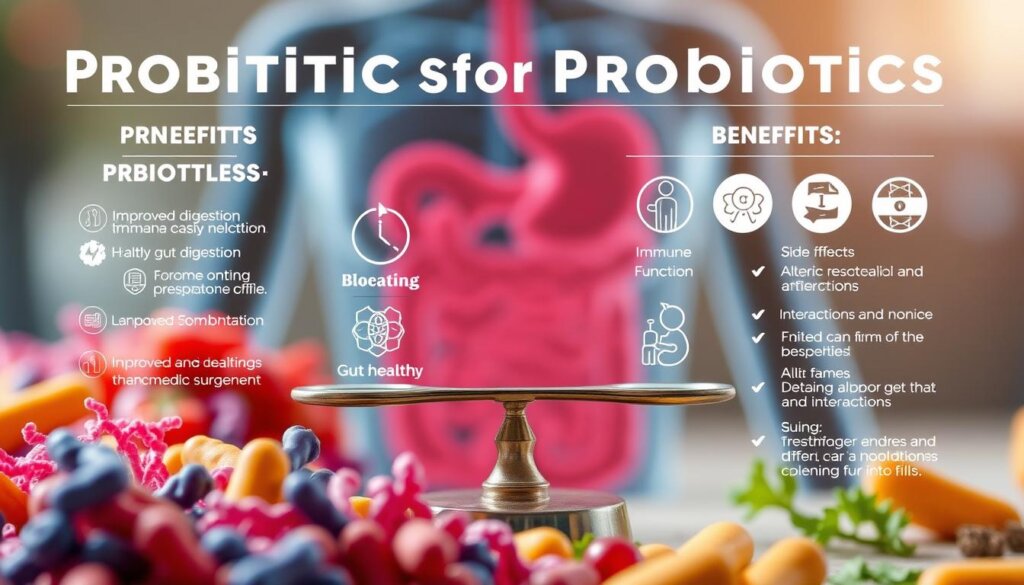Research shows that 1 in 500 people globally experience inflammatory bowel conditions, with symptoms often disrupting daily life. Many patients explore supportive approaches alongside medical care, seeking ways to ease discomfort and promote digestive balance.
Specific live microorganisms have drawn attention for their potential to support intestinal wellness. Studies suggest these beneficial bacteria might help maintain a healthier gut environment, though results vary between individuals. Current findings reveal a nuanced landscape where certain strains show promise while others lack conclusive evidence.
Healthcare providers increasingly emphasize personalized care strategies. In Malaysia, where tropical diets and lifestyle factors play unique roles, understanding these options becomes particularly relevant. This article examines science-backed insights about microbial supplements, separating verified benefits from overstated claims.
Key Takeaways
- Global prevalence highlights the need for diverse management approaches
- Microbial supplements show varying effectiveness in clinical trials
- Individual responses depend on biological and environmental factors
- Combination therapies often yield better results than standalone use
- Safety considerations remain crucial when exploring new options
Introduction to Probiotics for Crohn's Disease
Advancements in microbiome studies have opened new pathways for managing gastrointestinal health challenges. These approaches focus on maintaining microbial balance through specific strains of helpful organisms. When consumed adequately, they may assist in creating an environment where beneficial bacteria thrive.
Overview of Microbial Therapy

Click to LEARN MORE
Live microorganisms, including select bacterial strains and yeasts, work by interacting with intestinal cells. Available as supplements or in fermented foods like tempeh and yogurt, they aim to reinforce the gut barrier. Studies suggest this interaction might reduce inflammation markers in some individuals with chronic digestive issues.
Modern Care Integration
Healthcare teams now often combine traditional methods with microbial support.
“Targeting the microbiome offers a complementary path to modulate immune activity,”
notes a gastroenterology researcher. In Malaysia’s diverse dietary landscape, such strategies align with local preferences for natural wellness solutions. Explore more about theirdigestive health benefits here.
Current clinical approaches prioritize personalized plans, recognizing that responses vary based on genetic factors and lifestyle. This tailored method helps address unique needs while minimizing potential drawbacks.
Understanding Crohn's Disease and Inflammatory Bowel Diseases
Chronic gut conditions impact over 3.5 million people across Europe and North America, reshaping daily lives through unpredictable flare-ups. Inflammatory bowel disease (IBD) includes two main forms: Crohn’s disease and ulcerative colitis. Both trigger mucosal inflammation but differ in affected areas and symptom patterns.
Pathogenesis and Symptoms
Crohn’s disease develops when genetic risks meet environmental triggers like diet or infections. This combination disrupts immune responses, causing the body to attack healthy gut tissue. Over time, this imbalance leads to patchy inflammation that penetrates deep intestinal layers.
Common signs include cramping abdominal pain and urgent bowel movements. Some people notice blood in stool or sudden weight loss from nutrient absorption issues. Fatigue often accompanies these physical challenges, creating a cycle that affects overall wellness.
| Feature | Crohn’s Disease | Ulcerative Colitis |
|---|---|---|
| Affected Areas | Any part of digestive tract | Colon and rectum only |
| Inflammation Depth | All intestinal layers | Inner lining only |
| Common Symptoms | Patchy inflammation, fistulas | Continuous colon inflammation |
Treatment approaches vary based on these biological differences. While medications aim to calm immune overactivity, lifestyle adjustments help manage triggers. Understanding these mechanisms empowers patients to collaborate effectively with healthcare teams.
Scientific Insights into Gut Microbiome Research
The trillions of microbes in our intestines hold keys to unlocking IBD mysteries. Scientists now see these tiny organisms as active partners in maintaining intestinal balance
Studies reveal striking differences in bacterial populations between healthy individuals and those with chronic gut issues. Beneficial Firmicutes species, like Bifidobacterium, often dwindle in number. Meanwhile, less friendly groups such as Proteobacteria thrive—a pattern linked to persistent inflammation.
Researchers pinpoint Th17 immune cells as major players in this process.
“When microbial harmony breaks down, these cells trigger cascades that damage intestinal tissue,”
explains a gastroenterology specialist. This discovery highlights howmicrobiome disruptionscan turn protective systems into sources of harm.
The gut’s microbial community also strengthens barrier functions, blocking harmful invaders. However, imbalances allow pathogens to slip through, worsening symptoms. Current work focuses on identifying which bacterial strains best support recovery.
While findings remain preliminary, some trials suggest tailored microbial supplements could help reset these ecosystems. As science advances, personalized approaches may offer new ways to calm overactive immune reactions—especially in regions like Malaysia, where dietary habits shape unique gut environments.
Pros and Cons of Probiotic Treatment

Click to LEARN MORE
Exploring microbial supplements requires balancing potential gains with practical considerations. Many individuals seek these options to complement their care plans, but understanding both sides ensures smarter decisions.

Evaluating the Benefits
These supplements offer several advantages for digestive support:
- Generally safe for healthy individuals with minimal side effects
- May help maintain intestinal balance when combined with medical care
- Available through various formats like capsules or fermented foods
Cost-effectiveness makes them accessible compared to some prescription options. Patients often appreciate how easily they fit into daily routines without major lifestyle changes.
Assessing the Drawbacks
Potential challenges require careful evaluation:
- Limited evidence for specific effects on Crohn disease management
- Possible temporary bloating or digestive discomfort during initial use
- Quality variations between different product brands
“While generally well-tolerated, those with compromised immunity should consult specialists first,”
advises a Kuala Lumpur gastroenterologist. Research shows 15% of users report mild transient symptoms, though serious complications remain rare.
Current guidelines emphasize personalized risk assessment before starting any new regimen. Regular monitoring helps identify optimal approaches while minimizing unwanted effects.
Clinical Evidence and Study Findings
A groundbreaking 2023 analysis offers clarity on microbial therapies’ effectiveness in digestive care. This evaluation examined data from 2,713 participants across 14 countries, creating one of the most detailed pictures of gut health interventions to date.
Key Research from Systematic Reviews
The review analyzed 33 trials comparing microbial approaches with standard care. Only 36% of Crohn-focused studies showed meaningful improvement, with benefits typically appearing after 3-6 months of consistent use. This contrasts sharply with ulcerative colitis research, where 84% of trials reported positive outcomes.
| Condition | Studies Analyzed | Success Rate |
|---|---|---|
| Crohn’s Disease | 11 | 36% |
| Ulcerative Colitis | 25 | 84% |
| Combined Results | 33 | 58% |
Researchers noted that effective protocols often combined specific bacterial strains with personalized treatment durations. While outcomes vary, these findings help refine digestive wellness strategies for different needs.
The analysis emphasized rigorous methodology, ensuring reliable comparisons between diverse patient groups. Though not a universal solution, these insights guide healthcare teams in creating tailored approaches for better gut health management.
Diverse Probiotic Strains and Their Functions
Not all microbial supplements work identically—their effectiveness depends on strain specificity. Different types of beneficial bacteria serve unique roles in supporting intestinal wellness. Research highlights how certain combinations may enhance digestive comfort more effectively than single-strain options.

Bifidobacterium and Its Benefits
This bacterial group thrives in the colon, producing short-chain fatty acids that strengthen intestinal barriers. Studies show specific strains like Bifidobacterium longum help regulate immune responses. In clinical trials, these microorganisms outperformed placebos in maintaining gut balance during flare-ups.
Lactobacillus Profile
Found primarily in the small intestine, Lactobacillus species show mixed results for Crohn’s management. While some strains reduce gas production, others have minimal impact. A 2022 review noted their effectiveness often depends on formulation quality and individual gut environments.
Saccharomyces boulardii—a beneficial yeast—has gained attention for its ability to survive antibiotics. Unlike bacterial strains, it may help restore microbial diversity after infections. Researchers emphasize pairing it with digestive discomfort solutions for optimal results.
- Multi-strain blends often colonize different gut regions
- Dosage (measured in CFUs) impacts therapeutic outcomes
- Delivery methods like delayed-release capsules improve survival rates
Choosing the right combination requires understanding personal health needs. Healthcare providers in Malaysia often recommend gradual introduction to assess tolerance while monitoring symptom changes.
Comparative Analysis: Crohn's Disease vs. Ulcerative Colitis
Understanding how different gut conditions respond to treatments reveals critical insights. Research highlights a striking contrast: 84% of ulcerative colitis studies show microbial supplements help achieve remission. Only 36% of Crohn disease trials report similar success.
This gap likely stems from biological differences. Ulcerative colitis affects the colon’s surface, where beneficial strains thrive. Crohn disease involves deeper intestinal layers, making microbial balance harder to restore. These variations explain why tailored approaches matter.
Key findings include:
- 21 out of 25 colitis trials demonstrated reduced inflammation markers
- Multi-strain formulas work better for colon-focused conditions
- Immune response patterns differ between bowel disease types
Healthcare teams in Malaysia emphasize personalized plans based on these distinctions. While microbial support shows promise for colitis, Crohn management often requires combined strategies. Ongoing studies aim to identify strains that address deeper tissue challenges.
FAQ
Can gut bacteria influence inflammatory bowel conditions?
Research shows that imbalances in the gut microbiome may contribute to intestinal inflammation. Certain beneficial strains, like Bifidobacterium, can help restore balance and support immune function, potentially easing symptoms in some individuals.
Are specific strains more effective for maintaining remission?
Studies highlight strains such as Lactobacillus rhamnosus GG and Bifidobacterium infantis for their role in reducing flare-ups. Their effectiveness varies, so healthcare providers often recommend personalized approaches based on clinical evidence.
How do therapies for Crohn’s differ from ulcerative colitis?
While both are inflammatory bowel diseases, treatment strategies differ due to distinct affected areas. For example, probiotics like VSL#3 show stronger results in ulcerative colitis, whereas Crohn’s management may prioritize immune-modulating therapies alongside dietary adjustments.
What risks come with using microbial supplements?
Though generally safe, some people experience bloating or gas initially. In rare cases, those with compromised immune systems might face infections. Consulting a specialist ensures safer use, especially during active flare-ups.
Does diet interact with probiotic treatments?
Yes. High-fiber foods and fermented products like kimchi or kefir can enhance gut health synergistically. Avoiding processed sugars and artificial additives also supports microbial balance, improving treatment outcomes.
How long does it take to see improvements?
Results vary, but many notice subtle changes within 4–6 weeks. Consistency is key—regular intake paired with lifestyle modifications tends to yield better long-term remission rates compared to short-term use.
Are there evidence-backed brands recommended by experts?
Brands like Culturelle (Lactobacillus rhamnosus) and Align (Bifidobacterium longum) are frequently cited in clinical trials. Always check for third-party testing seals to ensure quality and potency.






